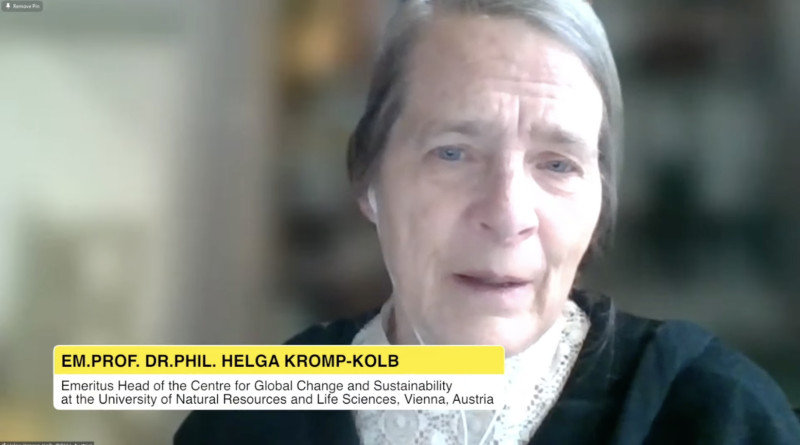The second day of the European Catholic Social Days, Saturday 19 March 2022, was devoted to the theme of digital and ecological transition processes. “Every effort to protect and improve our world entails profound changes in “lifestyles, models of production and consumption”.
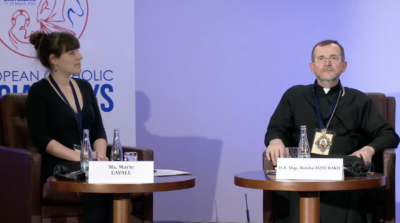
Debate on the technological transition in Europe. (Credit: Slovak Bishops’ Conference)
H.E. Mgr. Paul Tighe, Secretary of the Pontifical Council for Culture, delivered the first keynote speech of the day, addressing participants on new technologies, especially Artificial Intelligence (AI), and their impact on our societies. He highlighted the need for new pastoral and moral responses to the technological development.
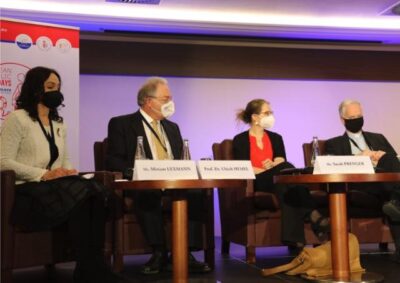
Panel debate on the technological transition in Europe. (Credit: Slovak Bishops’ Conference)
On the wave of Mgr. Tighe’s speech, the morning panel debate evolved around the challenges posed to our societies by the transformation of work caused by new technologies. The debate saw the participation of Sarah Prenger, President Emeritus of the International Young Christian Workers’ Movement, Ulrich Hemel, President of the German Association of Catholic Entrepreneurs, and Miriam Lexman, Member of the European Parliament. Watch the full video
In the afternoon, Daniel Guéry, Chargé de Mission at the French Bishops’ Conference, presented the contribution of European Catholic-inspired NGOs for the promotion of the common good, justice and solidarity in the context of the technological and ecological transitions.
The ecological transition was addressed in the afternoon panel. Professor Helga Kromp-Kolb, Emeritus Head of the Centre for Global Change and Sustainability at the University of Natural Resources and Life Sciences of Vienna, delivered a keynote speech on the challenges posed by the climate change.
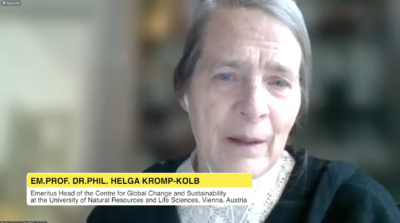
Professor Helga Kromp-Kolb, Emeritus Head of the Centre for Global Change and Sustainability at the University of Natural Resources and Life Sciences of Vienna.
The debate that followed included precious contributions from Philippe Lamberts, Member of the European Parliament, Marie Lavall, President of FIMCAP, and Mgr. Bohdan Dzyurakh, representative of Ukraine’s Greek Catholic Church.
Together, they analysed the ecological challenges ahead, and explored ways Catholics, especially families and youth, can contribute to a better care of our Common Home. A good summary of the debate is represented by Pope John Paul II’s statement included in Pope Francis’ Laudato Si’ Encyclical Letter: “Every effort to protect and improve our world entails profound changes in “lifestyles, models of production and consumption”. (Laudato Si’, 5)
During the debate, participants were moved by Mgr. Bohdan Dzyurakh’s testimony on the current tragedy unfolding in Ukraine. Mgr. Dzyurakh brought the suffering of Ukrainian families and prayed for a renewed Europe based on justice, freedom and fraternity. Watch the full video of the session
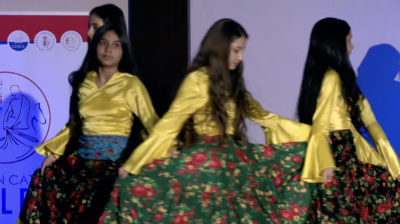
“Romaňi kereka”, a Roma celebration of motherhood offered by “Čiriklore”, a local Roma folklore youth ensemble.
The second day of the European Catholic Social Days was enriched by a colorful and dynamic cultural event, the “Romaňi kereka”, a Roma celebration of motherhood offered by “Čiriklore”, a local Roma folklore youth ensemble.
In the morning, the Presidents of the Slovak Bishops’ Conference, COMECE and CCEE released a statement welcoming Pope Francis’ call to consecrate Russia and Ukraine to the Immaculate Heart of Mary. Download the statement
Visit the official website of the event to download programme, speeches, contributions, videos and photos: www.catholicsocialdays.eu

